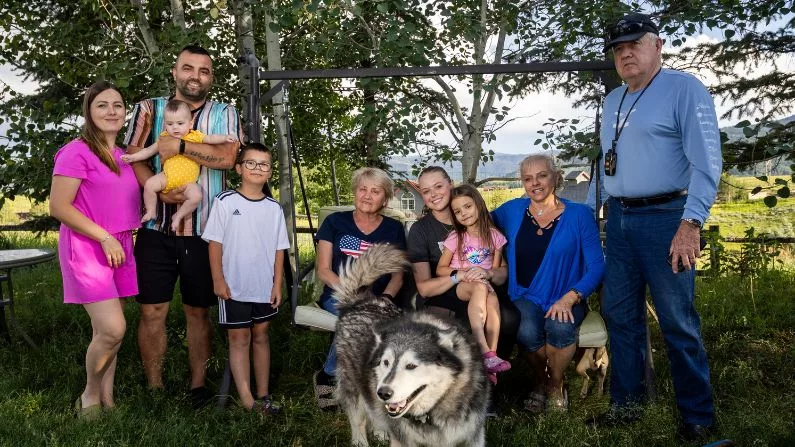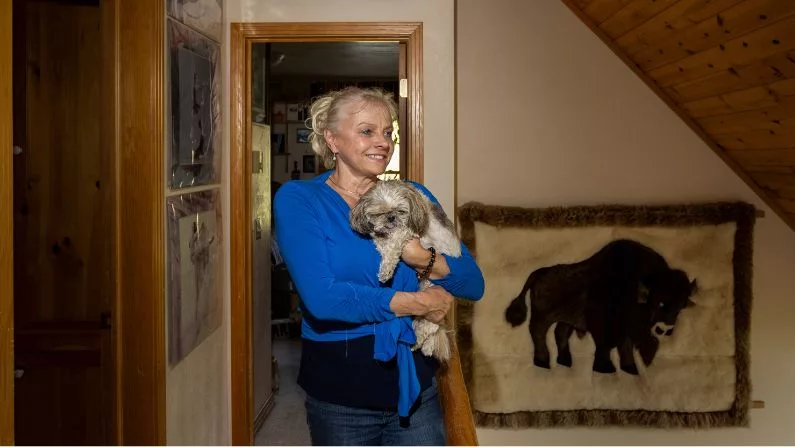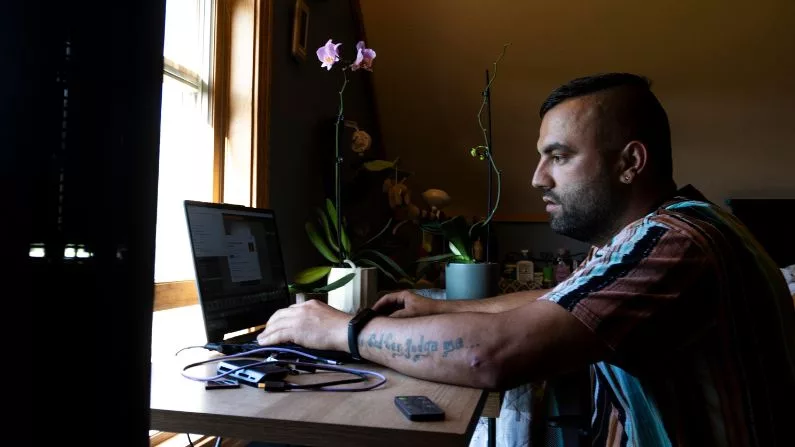Nestled between lush, green hills and surrounded by sky-high sunflowers, Tymur Azizov sat on the back patio of a home south of Jackson. Dogs ran and played in the yard near Game Creek.
The serene summer scene is much different than what Azizov experienced in Ukraine for over a year.
“I think it’s like 10 bombs, they drop it in our town,” recalled Azizov.
He said when his family first got to town, they were often scared when they heard the sounds of planes overhead.
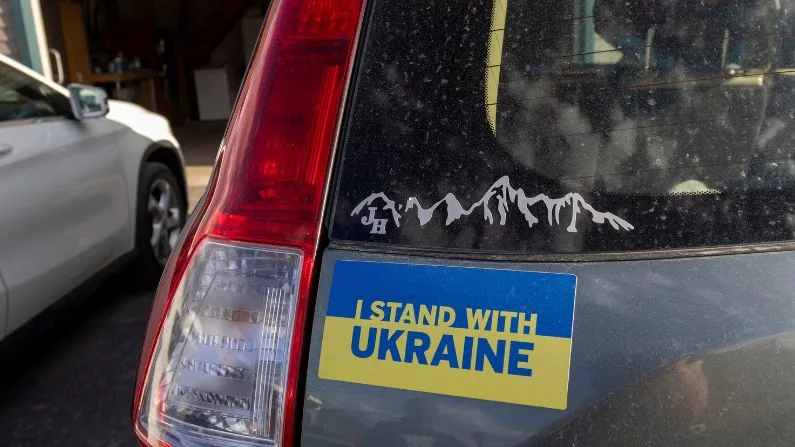
In February of 2022, Russia invaded Ukraine, resulting in tens of thousands of deaths and fatalities. (Natalie Behring/KHOL)
“Because for the last year, if you hear something in the sky, you need [to] hide somewhere,” he said.
Azizov and his family are from Korosten, a small city close to the border with Belarus — a close Russian ally. They’ve been in Jackson for just a few months.
“We dream about [coming] to the US, but like a tourist and not this reason,” Azizov said. “When you go somewhere when you don’t want it, it’s hard, you know. But all in our minds, it’s about our kids and safety, our kids’ safety.”
Finding a loophole
It was nearly impossible for Azizov to leave Ukraine with his family. The country is under martial law as the war rages on.
“So men between the ages of 18 and 60 aren’t legally allowed to leave the country of Ukraine. They’re supposed to stay and fight,” explained Azizov’s cousin, Inez Brunson, who he’s living with now.
At first, Azizov’s wife and two young kids went to Poland, but he couldn’t get across the border. They were separated for two months.
“But they went back in and then found out that a loophole is that if he was a man that had three children of his own lineage,” Brunson said. “So, that’s why we have a five-month-old living with us right now.”
Brunson said they’re called “freedom babies.” And — according to Azizov — having a third child has helped many Ukrainian families escaping the war, stay together.
“Like we have two kids. You think about third,” Azizov said. “So if that can save our family, too … For me it’s more population of Ukrainian people.”
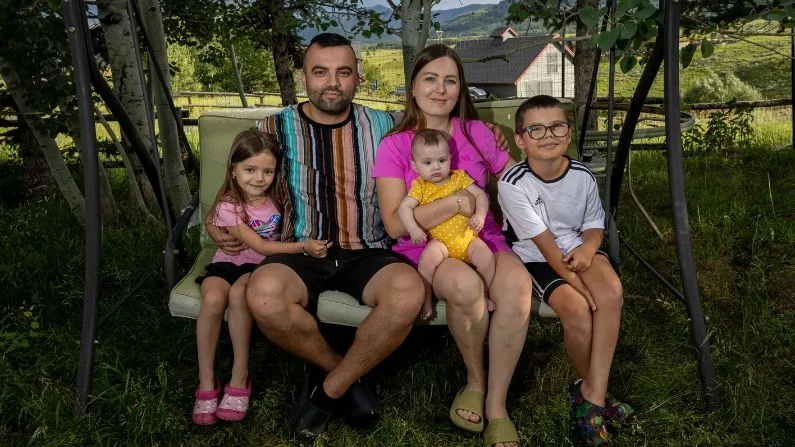
Tymur Azizov sits with his family in the backyard of the house they’re living in south of town. (Natalie Behring/KHOL)
Once their third child, Olivia, was born, there were still many challenges to getting to the U.S.
That includes days of travel across Eastern Europe only with a couple of small suitcases. And Brunson said it took about 15 pages of paperwork per family member to help get them over.
“Our extended family had to pay for their tickets here,” Brunson said. “It was several thousand dollars for all of them to get over here.”
She said they had a lot of relatives in Ukraine who they were trying to help get out, and it was a bit easier at the start of the war.
“The first wave of family were able to come here completely free to our expense because there were so many donations,” Brunson said. “This second round was definitely a bit different because people stopped caring, people stopped donating.”
A growing Eastern European population
Azizov and his family aren’t the only Ukrainian refugees in Jackson right now. His aunt, Olga Needham, said there are around 20 of them — who all came because they have family in the region.
They are joining a growing community of Eastern Europeans. Many Moldovans and Romanians, for example, have come for summer jobs and ended up staying, as many Jackson businesses rely on tourism and are constantly in need of workers.
But Needham says Eastern Europeans didn’t always flock here.
“I was first, 27 years ago,” she said.
Needham was born in Kyrgyzstan. She spent 12 years traveling the world as a trapeze artist for the Ukrainian and Moscow circuses and Barnum and Bailey. Then, she came to Jackson to teach gymnastics.
Why’d she stay?
“Oh, just life,” she answered. “Husband. Kids. My daughter was born here. Job and beauty. Remind me of Kyrgyzstan … mountains… so similar.”
Her daughter, 26-year-old Brunson, said growing up in one of the most remote areas of the U.S., her family stood out.
“People called me ‘the Russian,’ and it wasn’t necessarily incorrect because my mom is half and half, which made the war really weird — she’s half Ukrainian, half Russian,” Brunson said.
And now she and her mom have a full house.
“So, my husband said next time we buy a one-bedroom home,” Needham joked.
There are currently nine people living in the five-bedroom house. Upstairs, Azizov’s two older kids share a bedroom with his mother, Needham’s sister, who also came over from Ukraine. She sleeps on a cot in the corner.
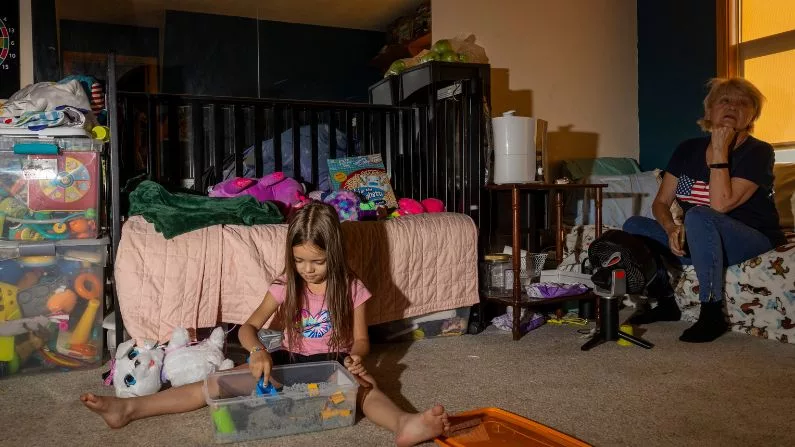
Zarina Azizova plays with toys in her room, while her grandma, Svetlana Azizova, sits on her bed in the corner. (Natalie Behring/KHOL)
And they’re living with a lot of dogs too.
“Somebody tell me six dogs, six refugees. each dog therapeutic for each member family,” Needham said, laughing.
Adjusting to life in Jackson
Azizov has been working at the Jackson Hole Airport for a car rental company — sometimes 15-hour days. He’s a photographer by trade but said he’s just doing what he needs to do for his family.
He wants a more permanent housing situation but said most places in the area are too expensive. He may consider moving to Idaho Falls and doing the two-hour commute to Jackson.
“So I think, okay, if [other] people can do it, why [not me],” he said. “I need to wake up early.”
Another barrier: his wife and kids don’t speak English, and it’s been hard getting the children into schools. But Azizov said the first and third graders will just have to learn the language.
“They don’t have a choice,” he said. “They need to do this.”
Jackson residents have helped the family, by donating clothes and toys for the kids. Churches and nonprofits have given them gift cards for groceries and gas. Azivov’s aunt recently held a fundraiser at a local dance studio, where he showed a film he made of the family’s life back home and journey to the U.S.
Azizov said he is hopeful the war will end and the family will be able to return to Ukraine, but for now, they’re making it work and just trying to enjoy Jackson.
“This is beautiful,” he said. “Everybody is smiling. Everybody says hi, you know. It’s nice. It’s different, and what you understand is safety, you know? Fresh air.”
Surrounded by the sounds of aspens blowing in the wind on a summer day, Azizov’s two older kids jumped on a trampoline. They’re no longer afraid of the planes that fly overhead. And five-month-old Olivia slept soundly, cradled in a stroller.
Azizov said growing their family was just another way to adjust to life.
“Every time after war, every time, start the baby boom,” Azizov said. “So we started a little bit early.”

